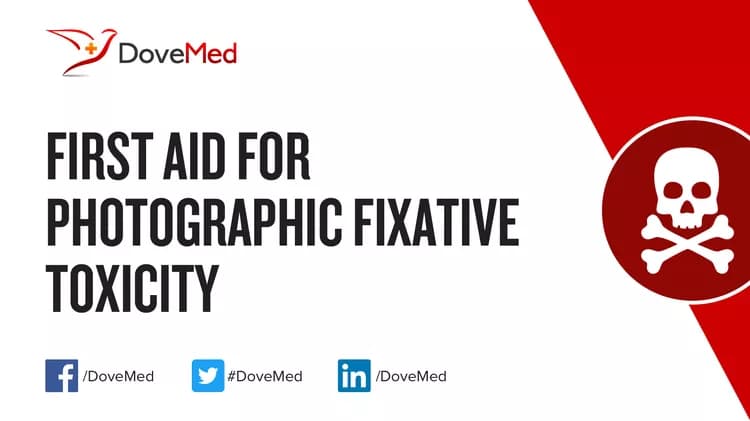What is Photographic Fixative Poisoning?
- Photographic fixative or photographic fixer is a complex mixture of various chemicals that is used in photography (for processing the film on paper)
- Photographic Fixative Poisoning is the accidental or intentional intake of any product containing the compound
- The condition is diagnosed based upon the clinical history, combination of signs and symptoms, and additional tests (that may include, in some cases, radiological studies and laboratory tests)
Photographic Fixative Poisoning may be also referred to variously as the following:
- Hydroquinone Poisoning
- Photographic Developer Poisoning
- Photographic Fixative Toxicity
- Photographic Fixer Poisoning
- Quinone Poisoning
- Sulfite Poisoning
What are the Causes of Photographic Fixative Poisoning?
- Photographic Fixative Poisoning is caused by the ingestion of photographic fixer
- This intake could be accidental, or in some cases intentional, to bring self-harm
- Since, photographic fixer is a mix of variously chemicals, the poisonous ingredient of the substance includes hydroquinones, quinones, sodium thiosulfate, sodium sulfite/bisulfite, and boric acid
Note: The compound can interact with other prescribed or non-prescribed medications in the body. Such interactions may enhance the therapeutic effects of other medications being taken, resulting in undesired side effects.
What are the Signs and Symptoms of Photographic Fixative Poisoning?
The signs and symptoms of Photographic Fixative Poisoning can vary from one individual to another. It may be mild in some and severe in others. Several systems of the body may be affected.
The signs and symptoms of Photographic Fixative Poisoning may include:
- Burning sensation or pain in the throat
- Skin rashes
- Vomiting
- Diarrhea; the stools may be bluish-green and/or watery
- In some cases, blood in stool may be observed
- Reduced blood pressure (hypotension)
- Lethargy and weakness
- Feeling dizzy, lack of coordinated movement
- Disorientation, low level of alertness
- Coma
How is First Aid administered for Photographic Fixative Poisoning?
First Aid tips for Photographic Fixative Poisoning:
- Call 911 or your local emergency help number immediately, for emergency assistance
- Call the Poison Control Center at 1-800-222-1222 (or your local poison control center) for further instructions
- Provide them with information such as the compound taken, quantity and time of ingestion, age, weight and general health status of affected individual
- Confirm that the airways are protected; also, ensure breathing and the presence of pulse
- Unless instructed by a healthcare professional, DO NOT induce vomiting in the affected individual
- Following an ingestion of the substance, immediately give milk to drink
- In case of symptoms that indicate difficulty in swallowing including vomiting or decreased alertness, do not give anything by way of mouth
- Take individual to emergency room (ER) for further treatment
- Always try to take the compound bottle/container to the ER
The emergency medical health professional might perform the following steps towards treating the condition:
- Gastric lavage for elimination of the substance from the stomach (irrigation using special solutions)
- Medically manage symptoms, such as vomiting and low blood pressure
- Provide breathing support, if necessary
- Administer activated charcoal to avoid absorbance of the substance in the body
- Administer laxatives for elimination of the substance from the body
- Administer fluids by an intravenous drip line
Who should administer First Aid for Photographic Fixative Poisoning?
First aid for Photographic Fixative Poisoning is administered by healthcare professionals.
- The individual who is affected, or someone near, should call 911 for emergency assistance (or the local emergency number)
- They should also call the poison control center at 1-800-222-1222 (or the local poison control center) and follow instructions
What is the Prognosis of Photographic Fixative Poisoning?
- The prognosis of Photographic Fixative Poisoning is dependent on the amount of substance consumed, time between consumption and treatment, severity of the symptoms, as well as general health status of the patient
- If the individual can recover from the symptoms, with appropriate medication and early support, the outcome is generally good
- In case of severe symptoms, it may considerably worsen the outcome. It is generally difficult to predict the outcome and can be assessed only on a case-by-case basis
In general, toxicities are common situations in the emergency departments. A majority of the cases are often not fatal, when appropriate treatment is given.
How can Photographic Fixative Poisoning be Prevented?
Photographic Fixative Poisoning can be prevented by:
- Always following instructions for usage of any chemical product
- Keeping any poisonous/hazardous chemicals and other materials out of children’s reach
- Being aware of basic first aid steps in case of an emergency (such as inadvertent poisoning)
What are certain Crucial Steps to be followed?
- Call 911 (or your local emergency number) for emergency assistance, if symptoms are life-threatening
- Call Poison Control Center at 1-800-222-1222 (or the local poison control center) and follow the recommend steps
- It would be helpful if the following information is readily available:
- Type, amount and time of consumption of the substance
- Age and weight of the individual
- And, the overall health status of the individual
Related Articles
Test Your Knowledge
Asked by users
Related Centers
Related Specialties
Related Physicians
Related Procedures
Related Resources
Join DoveHubs
and connect with fellow professionals


0 Comments
Please log in to post a comment.